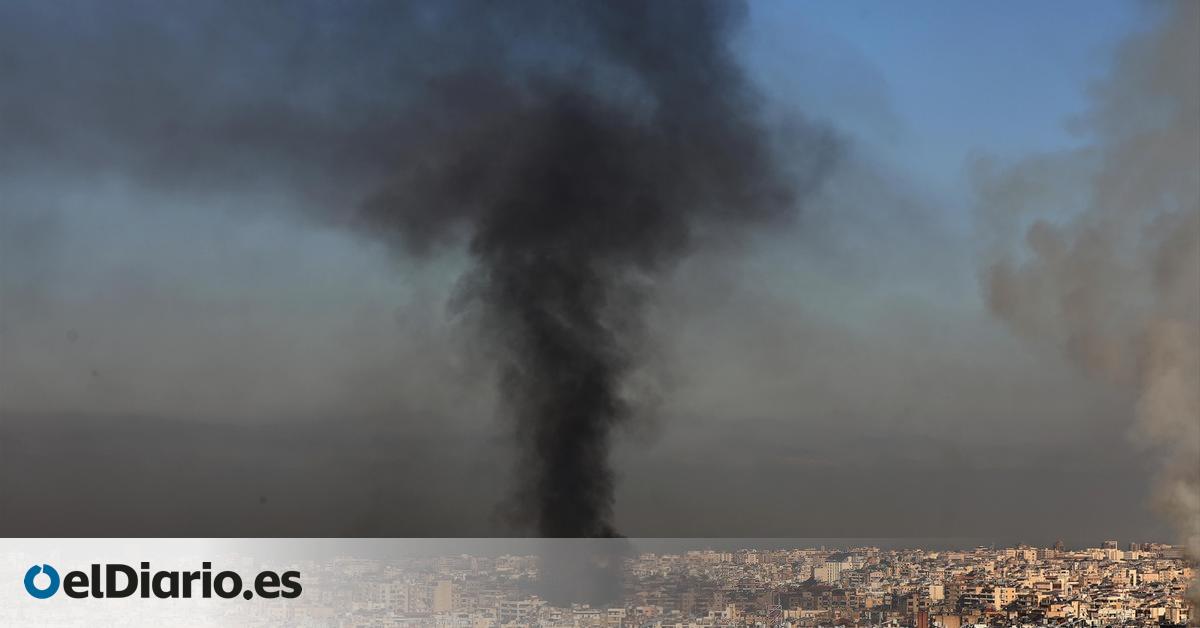
Israel has managed to behead the Shiite group Hezbollah, killing its leader, Hasan Nasrallah, along with other commanders who have been killed in recent weeks in selective attacks by Israeli aircraft. Nasrallah was one of the most elusive men in the Middle East, he had been living in hiding for years and without appearing in public in person, precisely to protect his life. Finally, the Israeli Army has taken it from them in an attack against the alleged Hezbollah headquarters in the south of the Lebanese capital, using bunker-buster bombs. Nothing remains of the six bombed buildings and probably neither of the mortal remains of the Shiite leader.
Along with Nasrallah, a deputy commander of the Iranian Revolutionary Guard – an armed body that collaborates closely with Hezbollah – and other commanders of the Shiite militia died, as well as several people who were still in the Dahie area, with a Shiite majority and a Hezbollah stronghold. from which many of its residents have fled this week for fear of Israeli attacks. Entire families are sleeping rough in the squares and streets of Beirut, considered safer than its southern suburbs.

This Saturday, Israeli aircraft continued to hit Dahie and, in one of the attacks, “eliminated” Hassan Jalil Yassin, head of the Hezbollah unit that identifies “military and civil objectives” in Israeli territory, according to a statement from the Army. Columns of smoke rose over the south of Beirut from the bombings and the dust still hung in the air caused by the strong explosions that killed Nasrallah on Friday evening, destroying six multi-story buildings. 33 people have also died and almost 200 have been injured by Israeli bombings on other parts of the country, according to the Lebanese Ministry of Health.
The Israeli Army and Government have defended this attack in a highly populated area and have described the objective as “legitimate.” “The elimination of the arch-terrorist Nasrallah is one of the most justified anti-terrorism actions that Israel has ever carried out,” said its Foreign Minister, Israel Katz. “Nasrallah, who dedicated his life to the destruction of Israel and led terrorist activity against Israel for more than 30 years, deserved to be killed and it is a positive thing that he was,” Katz stressed in his X account. The Forces of Defense have published a diagram of Hezbollah’s military leadership, with all its leaders crossed out with the word “eliminated”, even Nasrallah himself.
But the death of the Hezbollah leader has not stopped the launch of rockets from southern Lebanon towards northern and central Israel, where sirens warning of a bombing have sounded repeatedly this Saturday. Yemen’s Houthi rebels have also launched a missile into Israeli territory, which has been intercepted by air defenses. Most of the projectiles aimed at Israel have been destroyed and have caused no casualties, but the country remains on alert for possible retaliation from Hezbollah and its allies in the region – such as the Yemeni Houthis or pro-Iran militias in Iraq – . The Palestinian group Hamas, which Hezbollah has supported during the more than eleven-month offensive against the Gaza Strip, has said that Nasrallah’s death will increase “resistance in Lebanon and Palestine.”
The Iranian Revolutionary Guard also confirmed this Sunday the death of the military force’s deputy commander of operations, Brigadier General Abbas Nilforushan, in the same attack on Friday in which leader Hasan Nasrallah died. “Guard Brigadier General Abbas Nilforushan, one of the veteran and proud commanders of the holy defense and advisor of the IRGC (the guard) in Lebanon, joined his martyred comrades in the terrorist attack of the brutal regime Zionist on the afternoon of Friday, September 27,” they indicated, in a statement collected by EFE.
The ‘Axis of resistance’ promises to continue
The Lebanese political and armed movement has mourned the death of its secretary general, but has promised that it will follow the path marked by him during his 30 years of leadership. “The leadership of Hezbollah promises the highest, holiest and most precious martyr of our career (…) that he will continue his efforts to confront the enemy in support of Gaza and Palestine, and in defense of Lebanon and its honorable people “, he said in a statement collected by the EFE Agency.
After this hard blow, it is not known who will take the reins of Hezbollah, but the name that is being heard as a possible successor to Nasrallah is that of his maternal cousin and head of the Executive Council of the Shiite group, the cleric Hashem Safi al Din. Aside from heading the movement’s executive body, he has also been military commander in southern Lebanon since 2010, a key position in cross-border operations against Israel. Like most senior Hezbollah officials, Safi al Din is on Washington’s terrorist list, for being “a key member” of the group, according to a note published in 2017 by the US State Department.
Some analysts point out that, after the assassination of most of Hezbollah’s leadership at the hands of Israel, the new leaders, some of whom will belong to the new generations of the Shiite movement, could be more radical and less pragmatic than Nasrallah and the old guard The group could adopt a more violent line and, proof of this, is that since the brutal bombing on Friday afternoon in Beirut, Hezbollah has been launching rockets against inhabited areas and civilian targets, and not only military ones – as the group claimed it did. in the past months.
In Iran – godfather and sponsor of Hezbollah – the Government has decreed five days of mourning for the death of Nasrallah. Iranian Supreme Leader Ali Khamenei said in a statement that the legacy of the murdered Shiite cleric “will be strengthened by his blood,” according to the official IRNA news agency. Furthermore, the highest Iranian authority has said that it is an obligation of the Muslim world to support Hezbollah and the Lebanese, in the face of what he has described as “the slaughter of defenseless people in Lebanon.”
Meanwhile, the Iranian president, Masud Pezeshkian, has denounced the “terrorist” attack that took Nasrallah’s life and has stated that with his death “the family tree of resistance will be stronger than ever.” Tehran heads the so-called ‘Axis of Resistance’ against Israel and the United States, which includes militias such as Hezbollah, the Palestinian group Hamas, the Houthi rebels, as well as Syria.
In a statement published by IRNA, Pezeshkian said that “the Americans cannot exempt themselves from complicity with the Zionists,” although the Pentagon has assured that the United States has not been involved nor had it been informed in advance of the selective attack against Nasrallah.
The US supports escalation
Also on Friday, US Defense Secretary Lloyd Austin spoke twice by phone with Israeli Defense Minister Yoav Gallant about the Beirut bombing – the largest since the start of Israel’s air campaign against Lebanon this week. , in which about 700 people have died. According to a Pentagon statement, Austin “expressed his full support for Israel’s right to defend itself and its citizens against Iranian-backed terrorist groups.” Furthermore, he noted that Washington is “determined to prevent Iran and its allies and proxies exploit this situation to expand the conflict.”

As it has done in previous weeks and months, Joe Biden’s Government has supported its main partner in the Middle East against the groups that Israel and the US consider terrorist: Hamas and Hezbollah (the European Union only classifies the arms as terrorist). armed with both, but not their political formations).
President Biden has considered that with the assassination of Nasrallah “justice has been served for his many victims, including thousands of American, Israeli and Lebanese civilians.” “Hassan Nasrallah and the terrorist group he led, Hezbollah, were responsible for killing hundreds of Americans during a reign of terror that lasted some four decades,” the president recalled in a statement from the White House, in which he reiterated the right of Israel to self-defense.
The Government of Benjamin Netanyahu continues to count on US support for its offensives, both in the Gaza Strip and in Lebanon. Although the Biden Administration has urged a ceasefire in Lebanon – presenting a proposal together with France, which Israel has rejected – and has insisted that a full-scale war in the Middle East can still be avoided, it does not appear to consider that Israel’s incendiary actions could lead to a regional outbreak of violence.
The Israeli political and military leaders, knowing that they have the approval of Washington, are not willing to stop their war on two fronts: Gaza, in the south, and Lebanon, in the north. The Chief of the Army Staff, Herzi Halevi, has assured that the Israeli forces are “in their maximum preparation, both defensively and offensively, on all fronts, and are prepared for whatever comes next.”
Source: www.eldiario.es

